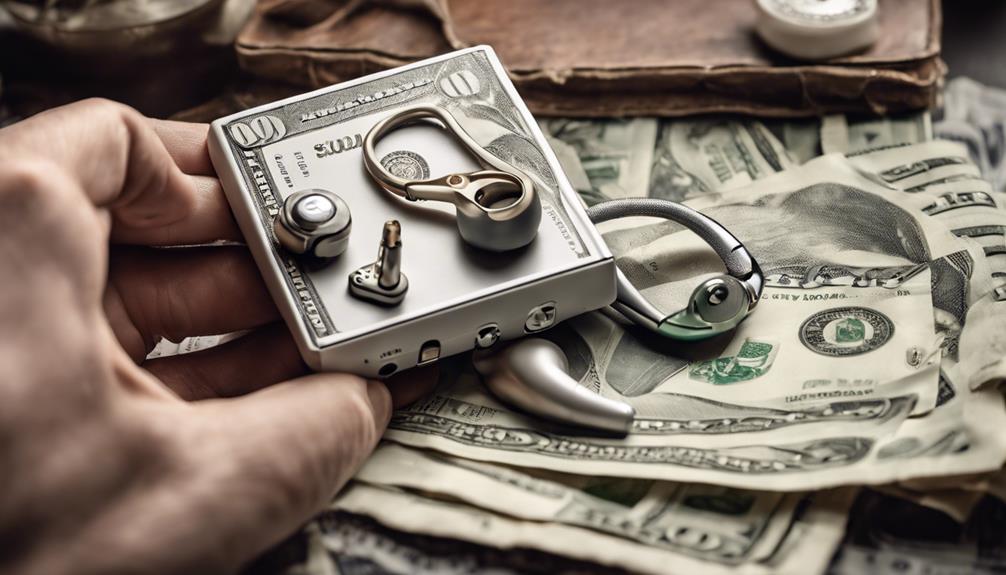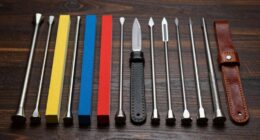Did you know that over 48 million Americans experience some degree of hearing loss, making hearing aids a vital tool for many individuals?
Understanding whether to insure your hearing aid is a decision that requires careful consideration and a thorough understanding of the options available.
By exploring the benefits, costs, and coverage types of hearing aid insurance, you can make an informed choice that ensures your device's longevity and your peace of mind.
Key Takeaways
- Insurance for hearing aids covers repairs, replacements, and unexpected costs.
- Premiums average around $300 annually for higher-end devices.
- Insurance ensures financial security and peace of mind for hearing health investments.
- Understanding coverage details, deductibles, and in-network providers is crucial for informed decisions.
Importance of Hearing Aid Insurance
Ensuring your hearing aid is properly protected through insurance is a vital step in maintaining your ability to hear clearly and comfortably. Hearing aid insurance provides coverage for repairs and replacements, offering financial protection against unexpected expenses. This safeguard ensures that your investment in hearing health is secure, granting you access to necessary care and services without worrying about the high costs involved.
For individuals with hearing aids, insurance plays a crucial role in managing the expenses associated with these devices. Given that the average lifespan of a hearing aid is approximately five years, having the right insurance coverage is essential for long-term peace of mind. Without insurance, the burden of covering the cost of hearing aids, which can range from $1,000 to $4,000 each, can be overwhelming.
Moreover, proper insurance coverage is especially beneficial for those who require frequent repairs or replacements, as it alleviates the financial strain and ensures that you can continue to enjoy the benefits of clear and comfortable hearing.
Cost of Hearing Aid Insurance

When considering the cost of hearing aid insurance, it's crucial to understand the details of the coverage, such as what's included in the policy and any deductibles that may apply.
Premiums for insurance can vary based on factors like the age and technology level of the hearing aid, so it's important to assess these aspects when choosing a plan.
Having insurance provides peace of mind against unexpected repair or replacement expenses, offering financial protection that can be invaluable in the long run.
Insurance Coverage Details
When considering insurance coverage for your hearing aid, the average cost typically amounts to around $300 per year for higher-end devices. Insurance coverage details are crucial for making informed decisions.
Here are some key points to consider:
- Coverage Inclusions: Insurance can cover replacement, repair, or both services for your hearing aid.
- Provider Options: Some insurance providers, like Ear Service Corporation, offer comprehensive coverage options tailored to hearing aids.
- Cost Factors: Insurance costs are influenced by the technology level and age of the hearing aid.
- Existing Policies: Review existing coverage in homeowners or renters policies to avoid overlapping coverage and unnecessary expenses.
Understanding these details can help you navigate the financial aspects of insuring your hearing aid effectively.
Premium and Deductibles
Understanding the financial implications of hearing aid insurance is essential for comprehensive coverage and cost management. Premiums for hearing aid insurance average around $300 annually for higher-end devices. Deductibles may apply, impacting out-of-pocket costs for repairs or replacements. The cost can vary based on technology level and age, influencing premium amounts. Insurance coverage typically includes replacements, repairs, or both, offering valuable financial protection. It's crucial to grasp details of premiums and deductibles to assess cost-effectiveness and make informed decisions about financial protection.
Benefits of Having Insurance
Having insurance for your hearing aid offers peace of mind and financial protection against unexpected expenses. Here are some key benefits of having insurance for your hearing aid:
- Coverage for High Costs: Insurance covers the substantial expense of hearing aids, which can range from $1,000 to $4,000 each, making them more affordable and accessible.
- Safeguarding Your Investment: Insurance ensures that repairs, replacements, and maintenance, which can accumulate to around $500, are covered, protecting your investment in your hearing aid.
- Alleviating Financial Burden: Without insurance, the financial burden of replacing or repairing a hearing aid can be overwhelming. Insurance helps alleviate this burden and provides financial security.
- Enhancing Quality of Life: Insurance guarantees access to quality care and services, ultimately enhancing communication abilities and overall quality of life.
Types of Coverage Available

Exploring the various types of coverage available for hearing aids can significantly impact your financial well-being and peace of mind in unexpected situations. When considering insurance for hearing aids, there are several options to choose from to suit your needs. Here is a breakdown of the types of coverage available:
| Type of Coverage | Description |
|---|---|
| Health Insurance Plans | Coverage may vary, so check your specific plan for details. |
| Hearing Aid Insurance Policies | These policies offer comprehensive coverage for replacements and repairs. |
| Employer-Sponsored Programs | Some employers include coverage for hearing aids in their benefit packages. |
| Government Assistance Programs | Various programs can help with the costs of hearing aids. |
| Medicare Advantage Plans | Some Medicare Advantage plans offer hearing aid coverage. |
Understanding these coverage options empowers you to make informed decisions regarding the financial aspects of your hearing healthcare. Whether through insurance, financing options, or assistance programs, there are avenues to support your journey to better hearing.
Factors to Consider

When considering insurance for hearing aids, it's crucial to weigh the cost implications and coverage options available. Evaluating the affordability of deductibles and copayments is essential in selecting the right insurance plan.
Additionally, checking for in-network providers can help optimize the benefits and minimize out-of-pocket expenses.
Cost Considerations
Considering the average annual cost of around $300 for insurance coverage on hearing aids, it's evident that factoring in this expense is crucial for managing overall affordability. When contemplating insurance for hearing aids, it's essential to weigh the following cost considerations:
- Total Hearing Aid Cost: Ranging from $2,000 to $8,000, insurance can significantly ease the financial burden.
- Repair and Maintenance Costs: Without insurance, these can add up to an extra $500.
- Standard Health Plan Exclusions: Standalone policies fill the gap for hearing aid coverage.
- Evaluation of Deductibles and Copayments: Understanding these factors helps in choosing the most cost-effective insurance option.
Careful evaluation of these aspects can lead to a well-informed decision regarding insuring your hearing aids.
Coverage Options
To make an informed decision about insuring your hearing aids, carefully assessing various coverage options is essential. When evaluating insurance plans, consider coverage amounts for hearing aids, repairs, and replacements to ensure comprehensive protection.
Review deductibles and copayments to gauge the affordability of the plans and avoid unexpected out-of-pocket costs. Checking for in-network providers can potentially lower expenses and streamline the process of accessing services.
It's crucial to ensure that the coverage includes repairs and replacements to avoid additional financial burdens. Additionally, considering the reputation and experience of insurance providers can help in selecting a plan that offers quality service and support for your hearing aid needs.
Choosing the Right Insurance

In assessing insurance options for a hearing aid, we must carefully evaluate coverage amounts and related services to ensure they align with our specific needs. Here are key factors to consider when choosing the right insurance:
- Coverage Amounts: Verify that the insurance provides adequate coverage for hearing aids, repairs, and replacements to avoid unexpected out-of-pocket expenses.
- Deductibles and Copayments: Understand the deductibles and copayments associated with the insurance plan to determine the overall affordability of coverage.
- In-Network Providers: Check for in-network providers to potentially reduce costs and ensure seamless processing of claims for hearing aid services.
- Repairs and Replacements: Ensure the insurance policy covers necessary repairs and replacements for your hearing aid to maintain its functionality over time.
Tips for Comparing Options

When comparing insurance options for hearing aids, it's crucial to carefully assess coverage amounts, deductibles, in-network providers, and services like repairs and replacements to make an informed decision that best suits your needs. Start by comparing the coverage amounts offered by different insurance providers.
Look into the deductibles and copayments associated with each plan to understand your out-of-pocket expenses. Checking for in-network providers can help you save on costs, as they've pre-negotiated rates with the insurance company.
Ensure that the insurance coverage includes provisions for repairs and replacements, as these services are essential for maintaining your hearing aid. Additionally, consider the reputation and experience of the insurance providers when making your comparisons.
How Insurance Works

Understanding how hearing aid insurance operates requires grasping the coverage details and potential benefits it offers to policyholders. When considering hearing aid insurance, here are some key points to keep in mind:
- Coverage Options: Hearing aid insurance typically covers replacement, repair, and even loss of the device, providing peace of mind in case of unexpected situations.
- Costs: The costs for hearing aid insurance can vary but generally range around $300 per year for higher-end devices. It's essential to weigh this cost against the potential benefits and coverage offered.
- Manufacturer's Warranty: Before purchasing additional insurance, it's crucial to check the warranty length and existing coverage provided by the manufacturer. This helps in avoiding overlapping coverage and unnecessary expenses.
- Reviewing Options: After the manufacturer's warranty expires, reviewing insurance options becomes vital for continued coverage. Providers like Ear Service Corporation offer comprehensive coverage options tailored to the specific needs of hearing aid users.
Financial Assistance Options

Exploring financial assistance options for hearing aids opens up avenues for individuals to access support and resources tailored to their specific needs. Several programs and organizations offer financial aid to help individuals afford hearing aids. The Hearing Aid Project directory and Starkey Cares Neighbors in Need are among the initiatives providing assistance in acquiring hearing aids. Additionally, the Federal Government's Hearing Services Program contributes towards lost hearing aids with a possible small replacement fee, making replacements more accessible. Community service organizations like Easter Seals and state resources such as AUDIENT also offer financial aid for hearing aids. Eligibility requirements for these programs vary, with some specifically designed for low-income individuals. It is crucial to keep detailed documentation to qualify for replacement support from these financial assistance programs. By exploring these options, individuals can find the necessary support to prioritize their hearing health.
| Financial Assistance Programs | Description |
|---|---|
| Hearing Aid Project directory | Provides financial aid for hearing aids |
| Starkey Cares Neighbors in Need | Offers assistance in acquiring hearing aids |
| Federal Government's Hearing Services Program | Contributes towards lost hearing aids with a possible small replacement fee |
| Community service organizations & state resources | Provide financial aid for hearing aids, with eligibility criteria varying |
Frequently Asked Questions
Should You Insure Your Hearing Aid?
We believe that insuring your hearing aid is a personal decision that hinges on various factors. Considering the potential cost of replacement or repair and the level of coverage needed can help determine if insurance is right for you.
Exploring existing warranties and insurance options can provide insight into the best choice for safeguarding your device.
Ultimately, weighing the benefits against the costs will help you decide whether insuring your hearing aid is a prudent investment.
Does Homeowners Insurance Cover Hearing Aid Loss?
We found that homeowners insurance generally doesn't cover hearing aid loss. It's crucial to check your policy for any optional coverage or riders that might protect personal belongings like hearing aids.
Listing them separately and considering a specific endorsement for high-value items can enhance coverage. Understanding the terms of your policy is key to ensuring your hearing aids are protected in case of loss.
Does Travel Insurance Cover a Lost Hearing Aid?
Yes, travel insurance may cover lost hearing aids, but coverage varies. Some policies require listing hearing aids separately. It's crucial to review your policy's terms.
Bringing a backup set is wise. Check if your coverage includes hearing aid replacement to avoid unexpected expenses.
Can You Use Insurance for Costco Hearing Aid?
Yes, insurance coverage for Costco hearing aids varies among providers. Some plans may partially cover the cost, reducing out-of-pocket expenses.
It's important to check with your insurance provider to determine eligibility for Costco hearing aid coverage. Utilizing insurance can be beneficial in offsetting costs.
Conclusion
In conclusion, insuring your hearing aid is a wise decision to protect your investment and ensure you have access to necessary repairs and replacements.
For example, a friend of ours recently had their hearing aid accidentally damaged, and their insurance coverage helped cover the cost of a replacement, saving them from a significant financial burden.
Remember, having insurance for your hearing aid provides peace of mind and financial security for the future.











